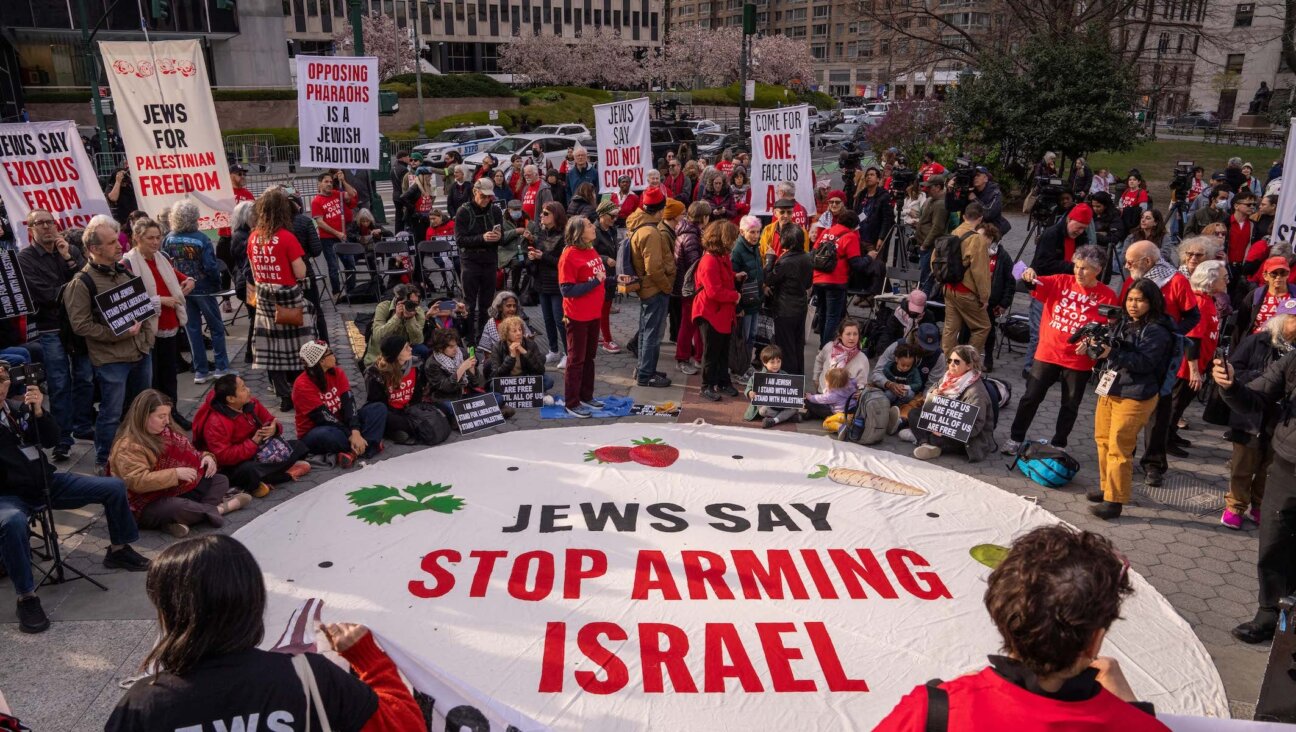Meet the rabbi ‘queering’ religion at the Jesuit Catholic University of San Francisco

Graphic by Angelie Zaslavsky
(J. The Jewish News of Northern California via JTA) — Since becoming University of San Francisco’s rabbi-in-residence in 2019, Rabbi Camille Angel has been busy, whether she’s creating inclusive on-campus spaces, teaching classes, officiating Jewish lifecycle events or leading Passover seders.
All in a day’s work for a campus rabbi, perhaps, but her impact is being felt well beyond the university’s Jewish community.
When Angel’s hiring was announced, it made headlines. A Jesuit Catholic university appointing a rabbi-in-residence was unprecedented, especially when that rabbi is a lesbian and longtime LGBTQ activist.
“I was trained and I’m a rabbi to serve Jews, and I do — I led a shiva two nights ago, so I’m definitely still serving Jews,” Angel told J. “But there’s something remarkable for me and totally unexpected about my rabbinate being primarily among non-Jews at this point and that my teaching is primarily with non-Jews.”
According to Angel, there is only one Jewish student in her “Queering Religion” class of 40. The other students represent a mix of religious affiliations, but they gravitate to Angel’s classes and programs because of the inclusive queer community she has cultivated on campus.
“I actually didn’t know much about Judaism and what a rabbi was or what they did,” said Jade Peñafort, a senior sociology major from Redwood City. “But honestly, I love it. I’ve learned from her that in Judaism, some of the core values are just working with other people and for other people and as a community. It’s not just about yourself.”
Angel said it’s important for her to be a visibly Jewish and queer presence on campus — both in and out of the classroom. She regularly wears an embroidered kippah and keeps a rainbow pride flag displayed in her office window. She emphasizes how much real representation and inclusion matter, especially when many students have never interacted with Judaism or Jewish thought or even met a rabbi.
“Students will often ask me, ‘What should I call you? Professor? Doctor? Rabbi?’” Angel said. “I tell them to call me rabbi, because everyone needs a rabbi, and if you didn’t have one before, now you do.”
Before joining the seven-person University Ministry staff as the on-campus rabbi, Angel had been lecturing at USF for several years as part of the Swig Program in Jewish Studies and Social Justice, which she largely credits for her presence on campus.
Ordained rabbi at the Hebrew Union College-Jewish Institute of Religion, Angel places a lot of emphasis on being a positive, identity-affirming spiritual adviser regardless of students’ backgrounds or belief systems. Angel finds that many of her students’ relationships with religion often are complicated by negative experiences due to their sexual orientations or gender identities. But they are also curious and seeking for themselves to figure out whether they want to explore spirituality.
“When I was teaching my first [theology] class, I encountered so many people who’d been really damaged and hurt by religion, or who had chosen not to be associated with religion, because they could see that it hurt people they loved,” said Angel. According to USF, a majority of undergraduate students are unaffiliated with a religion, while others identify as Buddhist, Hindu, Jewish, Muslim, atheist or Protestant. Fewer than half are Catholic.
According to a 2020 study by the Trevor Project, LGBTQ young adults whose parents held negative religious beliefs about homosexuality were at twice the risk of attempting suicide.
In her “Queering Religion” class, Angel teaches from a Jewish perspective how to navigate religious contexts, especially those religions that have often attempted to negate queer people. Many students credit Angel and this class with helping them re-evaluate and reconnect with their respective spiritual traditions.
This was the case for Luis Anaya, a senior sociology major, for whom growing up Mexican American and Catholic went hand in hand, but being queer and Catholic, not so much.
“I had a lot of reservations around religion because growing up and being queer, I innately had a different experience and different perspective on Catholic teachings,” said Anaya, who was born in Mexico City but grew up in Stockton.
When he took Angel’s class, he said, he also was taking strides in exploring and navigating his queer identity, so the intersection of queer narratives and spirituality was particularly meaningful for him. He also said exposure to Jewish thought helped to repair his strained relationship with Catholicism.
“Rabbi Angel talks a lot about pluralism, how different identities can coexist at the same time, and the idea of not reading the text literally, but rather interpreting it to get a better perspective of what these people were trying to write about and the messages that they were trying to convey,” Anaya said. “To question things and almost approach them with a grain of salt.”
Peñafort had a similar experience. Raised Catholic, she stopped going to church in her teens. She says she struggled with Catholicism for several reasons, but especially when her older sister came out as queer. She says the tools she learned in Angel’s class helped her figure out how to deal with her conflicting beliefs around religion. Peñafort says Angel’s class also helped her feel comfortable exploring her own sexuality and identity as a Fillipina woman and sister.
“Even though I felt like I didn’t fit into Catholicism and their values, I was still able to take little pieces and apply it to myself or just reframe it in a way that applies to me and my life and my identity,” said Peñafort.
With Angel as a facilitator, Anaya and several other students started a peer-led LGBTQ group on campus called “Qmmunity,” which Anaya describes as a sort of extension of Angel’s class and the Jewish values she teaches. On Thursdays, the group hosts a lunch program called “Breaking Bread and the Binary,” in which students come together to share a meal, their thoughts and reflections on current events.
The first session this semester was held Jan. 27 on Holocaust Remembrance Day and shortly after the Jan. 15 Colleyville, Texas hostage crisis. Angel expressed how significant the gathering felt and how it reminded her of the importance of creating inclusive spaces not just for Jewish students but for all marginalized people.
“Being in this group out and proud, here and queer, on the lawn in front of the church, it’s the biggest satisfaction that Hitler and the Nazis and fascism and fundamentalism don’t rule our lives,” Angel said the next day, reflecting on the session. “We’re here, together, and we won’t be frightened back into our respective closets.”
Next month, Angel will host the inaugural Alvin H. Baum Jr. Memorial Lecture, in honor of the San Francisco philanthropist known as a community pillar in the Jewish, civil rights and gay communities who died last year. In April, she’s leading a social justice-centered interfaith Passover seder focused on themes of climate justice, interfaith solidarity, peace, health and freedom. She also has plans to expand community outreach to address the issue of food insecurity among college students, something that affects LGBTQ people at twice the rate of others, according to the U.S. Census Bureau.
All throughout, her core focus is on the intersection of religion and queerness.
“I think it’s so refreshing to hear a different perspective,” Peñafort said, “and even if it’s based on a religious point of view, it doesn’t necessarily feel like it is. It just feels like she’s a very wise woman, and a mentor and a friend.”
This article was originally published in J. The Jewish News of Northern California, and is reprinted with permission.
—
The post Meet the rabbi ‘queering’ religion at the Jesuit Catholic San Francisco University appeared first on Jewish Telegraphic Agency.














